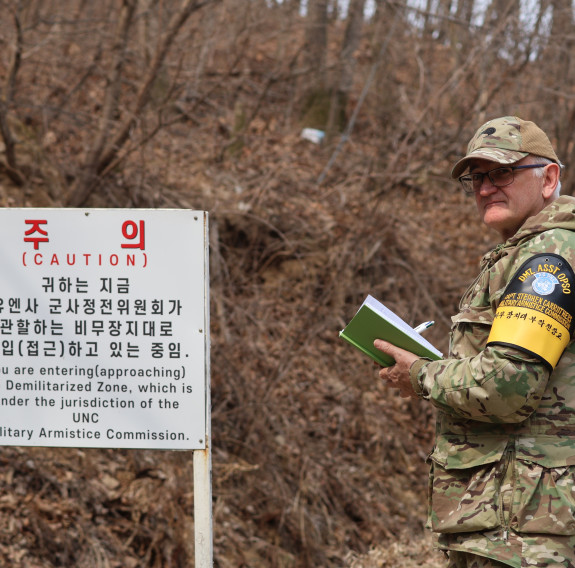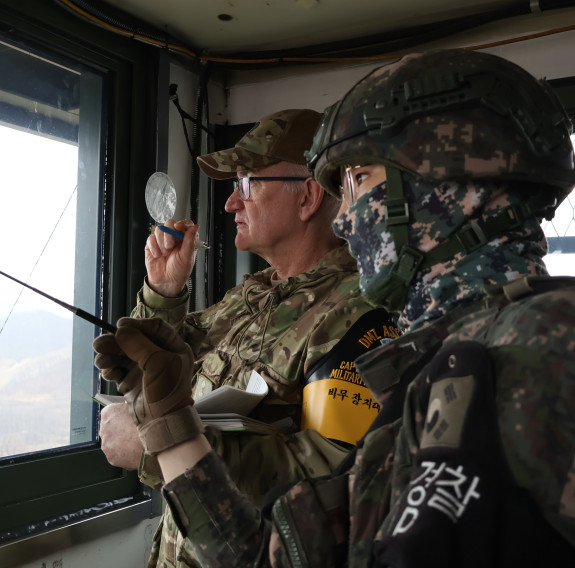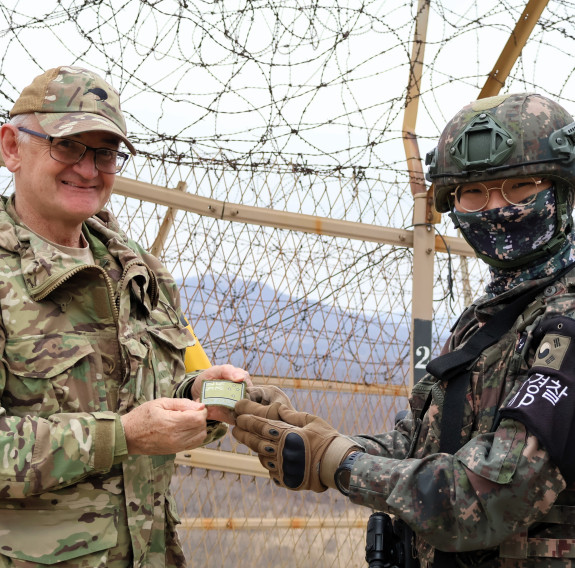New Zealand Army Captain Stephen Carruthers reflects on being part of a 75-year legacy of monitoring along the length of the demilitarized zone (DMZ) dividing North and South Korea.

11 July, 2025
People may come and go, but the Armistice Agreement between North and South Korea is constant, says Captain Carruthers.
Seventy-five years after the Korean War began, a multinational team continues to conduct regular inspections along the length of the demilitarized zone (DMZ) dividing North and South Korea to ensure compliance with the 1953 Korean Armistice Agreement which ceased hostilities.
United Nations Command Military Armistice Commission (UNCMAC) members visit and inspect Republic of Korea (ROK) brigade tactical operation centres, guard posts, observation posts and the land corridors between the two Koreas.
UNCMAC assistant operations manager, New Zealand Army Captain Stephen Carruthers says the commission has been “on the front line” since the Armistice Agreement was signed.
“Knowing that the Armistice Agreement is still in effect and I’m there helping that legacy continue, especially when you can see what could happen if we weren’t there, is very important to me.”
He must ensure that ROK divisions within his area of operations consistently follow the rules and guidance provided by the Armistice Agreement.
The July 27, 1953 agreement between the Commander-in-Chief, United Nations Command, the Supreme Commander of the Korean People’s Army and the Commander of the Chinese People’s volunteers suspended open hostilities and withdrew all military forces and equipment from a four-kilometre-wide demilitarized zone.
United Nations Command Military Armistice Commission DMZ Assistant Operations Officer, New Zealand Army Captain Stephen Carruthers (center) stands by a marker on the edge of the demilitarized zone which separates military forces on the Korean Peninsula on
United Nations Command Military Armistice Commission DMZ Assistant Operations Officer, New Zealand Army Captain Stephen Carruthers (left) interviews a Republic of Korea Army soldier during an inspection on the edge of the demilitarized zone which separate
Captain Stephen Carruthers swaps a New Zealand patch with a Republic of Korea Army soldier.Scroll to previous imageScroll to next image
A key provision is neither side shall execute any hostile act within, from, or against the demilitarized zone.
Potential Armistice Agreement violations range from firing across or into the DMZ and operating drones in the DMZ to not displaying the appropriate flag on vehicles or buildings.
Captain Carruthers’ deployment to Korea will run for 12 months.
“I discussed the idea with my family first, ensuring they were involved with the decision to apply and what it would mean. I believe I was chosen because I had the desired skills and maturity that was looked for. Army has given me a lot of opportunities so saying, yes, I’ll step up and do that, gave the organisation a solution and allowed them to then focus on other things.”
He says he works with an amazing group of people. “I work alongside Colombians, Danes, Australians, Canadians, US, and importantly South Koreans – all on board with the mission to ensure the Armistice is enforced.
“In some cases, I lead inspections with this multinational flavour, to places few people go. During these inspections I ensure everyone is included and their contribution valued. This means being patient and listening to people, being not just open to new ideas, but receptive of viewpoints that challenge your view on the world.
“It’s a collaborative, dynamic and at times fast paced environment. It’s inspiring and fits in with who I am.”
Captain Carruthers says one thing that resonates with him is seeing young, conscripted Koreans reacting when he hands out kiwi patches.
“The patch I take is one that represents Operation Monitor, with a history that dates back to the Korean War when our forebears drove their trucks and hauled our artillery in support of the United Nations Command Forces. The Kiwi was seen by everyone that encountered the New Zealand Forces.
“I give these patches to young Korean conscript soldiers, stationed along the DMZ in places I’m privileged to visit. I tell them the story behind the patch, and I invariably get to see the smile on their face when they know that New Zealand has been there supporting Korea for a very long time. Seeing that reaction is priceless.”
Captain Carruthers, from Christchurch, joined the New Zealand Army in 1987. He’s been deployed to former Yugoslavia, East Timor and Afghanistan.
“I joined because I had, and still have, a sense of service. It’s a willingness to go further, do more, help others, do something where you’re constantly thinking on your feet and to support the goals of New Zealand.
“For me, it’s being able to help people less fortunate get their lives back on track and collaborate in a team environment that makes a real difference.”
from WordPress
via IFTTT
No comments:
Post a Comment